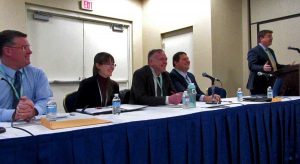Falcons Take Flight: Alumni Participate in American Historical Association’s 2018 Annual Meeting
The BGSU History Department received some excellent recognition at a scholarly conference at the beginning of the year when alumni presented research at the highest profile gathering of historians in the country.
On January 5, Michael Kneisel (M.A., 2014), Lindsey Bauman (M.A., 2017) and Michael Horton (M.A., 2017) presented “Teaching the Master Narrative,” at the American Historical Association’s 132nd annual meeting in Washington, D.C. The session focused on the accepted narratives of different historical figures and events within 20th century U.S. history textbooks.
Mike Horton’s paper, “Texas Discovers Columbus: The Columbian Legacy in Texas Textbooks, 1919-2017,” examined how textbooks portray the arrival of Christopher Columbus in 1492. Mike Kneisel’s paper, “Constructing an American Mythology: The Boston Tea Party in High School Textbooks,” looked at how textbooks present the 1773 Boston Tea Party. And Lindsey Bauman’s paper, “Suffering in Silence: The Voice and Representation of Slaves in 1950s American History Textbooks,” examined how textbooks describe slavery in the antebellum South.
“The preparation process for our session was fairly meticulous, but it provided its own valuable networking opportunities,” said Lindsey Bauman. “Following all of the groundwork, actually presenting at the conference was its own kind of reward. The event presented us with a platform to reach a diverse group of professionals.”
The lively presentation was attended by an audience of 70-80 that included college professors, high school teachers, textbook writers, public historians, and journalists. Afterward, a New York Times reporter interviewed Lindsey Bauman for a story about Confederate monuments.
The session was organized by Dr. Ruth Herndon and chaired by Dr. James Buss, Dean of the Honors College at Salisbury State University (Maryland) and another BGSU alumnus (M.A., 2002). Dr. Kyle Ward, Social Studies Director at Minnesota State University, Mankato, who has written about high school history textbooks, became an honorary falcon for the weekend and joined the session as its commentator.
The study of textbooks is a vibrant field of historical study. Textbooks evolve with society; textbook versions of history often conflict with each other as new generations interpret the past through different lenses. Audience discussion and twitter posts about the session reflected this controversy over how historical knowledge is produced and then reproduced in textbooks. Dr. Buss identified the session’s central question for historians: “How can (and should) we ask our students to undertake the difficult task of thinking like an historian?” The three papers, he said, “proffer suggestions for how we might think about teaching the past as we move into the future.”
The three papers showed how textbook history tends to legitimate the perspective of those with the most cultural and political power at the time of publication. “The presenters’ papers made me very happy because they went beyond the obvious,” said Dr. Ward. “What I’ve found is that stories change, stories disappear, or stories remain intact. The accepted role of history education is to help create better citizens, and these stories reflect what kind of citizens students are expected to become.”
Mike Horton spoke for all three presenters when he pointed to “the conversations” generated by the session. These conversations provided valuable feedback about new sources and research techniques; they also introduced the presenters to potential collaborators in future projects.
Mike Kneisel is currently in the History Ph.D. program at Kent State University; Mike Horton is in the Master’s Program in Underwater Archaeology at the University of Miami (Florida); Lindsey Bauman worked most recently as archivist and historical researcher at Whirlpool Corporation in Clyde, Ohio.
# # #
Pictured: Ward, Bauman, Kneisel, Horton, Buss

